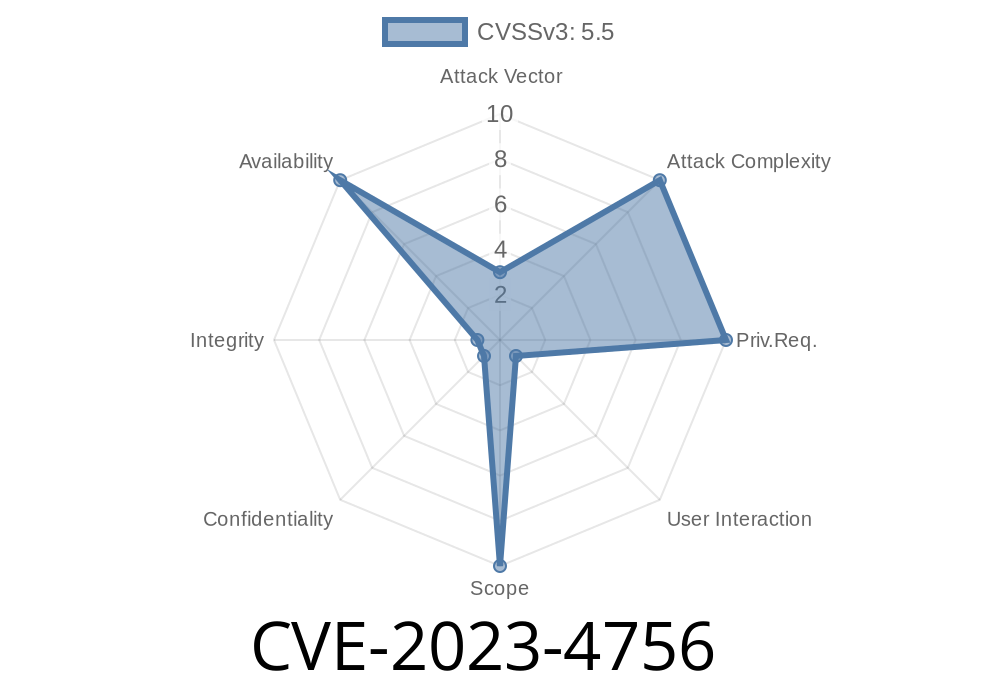On October 19, 2023, a new security vulnerability, tracked as CVE-2023-4756, was published. This vulnerability is a stack-based buffer overflow found in the open-source multimedia framework GPAC. Developers and users of GPAC, especially those running versions prior to 2.3-DEV, should pay close attention.
What is GPAC?
GPAC is a popular open-source multimedia framework, often used for packaging, streaming, and playing multimedia content like MP4 files. Developers trust it for creating media servers, streaming applications, or even video editing tools.
Unfortunately, as with all complex codebases, bugs can sneak in—sometimes with serious security implications.
What is CVE-2023-4756?
CVE-2023-4756 is a stack-based buffer overflow found in the gpac repository, prior to version 2.3-DEV. In English, that means: the program could end up writing more data into a "stack buffer" (a small piece of memory), than it can hold, causing adjacent memory to be overwritten.
Technical Details and Vulnerable Code Snippet
The vulnerability was reported in GitHub Issue #2529. It happens in the src/utils/error.c file of GPAC. Specifically, unsafe functions like sprintf (instead of safer alternatives like snprintf) may write more data than the buffer allows.
Example (simplified pseudo-code)
// Vulnerable function (example)
void errorMsg(const char *msg) {
char buffer[256];
sprintf(buffer, "Error: %s", msg); // 🚩 Vulnerable to buffer overflow!
}
If a malicious user manages to pass a very long msg (over 256 bytes), the buffer array cannot hold the whole string, leading to a buffer overflow.
The Real Vulnerable Code?
While the actual code in GPAC is more complex, you can see in the patch commit and the report, the unsafe functions look similar.
How Could This Be Exploited?
For a real-world attack, let’s say an attacker can control a piece of data that gets passed to some logging or error string function, and that data is long enough to overflow the buffer.
Malicious input file (simulated)
# metadata.txt
title=AAAAAAAAAA...AAA (400 'A's)
Then use it with
MP4Box -itags title=...very_long_input... video.mp4
If MP4Box writes the title into a fixed-size buffer without checks, this could crash—or worse.
Links to Official References
- NVD Entry (CVE-2023-4756)
- GitHub Security Advisory
- huntr.dev report (with bounty)
- gpac/gpac Commit Fixing the Issue
What Was Fixed?
The fix (see the commit above) simply changes unsafe functions like sprintf() to their safer alternatives (snprintf()) which force a maximum buffer length:
// Secure version
snprintf(buffer, sizeof(buffer), "Error: %s", msg); // Prevents overflow
On Linux systems, you might upgrade with
# On Ubuntu/Debian, if GPAC is available in repos
sudo apt update
sudo apt install gpac
Or build latest from source
git clone https://github.com/gpac/gpac.git
cd gpac
git checkout v2.3.-dev
./configure
make
sudo make install
Conclusion
CVE-2023-4756 is a great reminder: buffer overflows still happen, and can lead to serious risks, even in modern open source projects. If you’re using GPAC, upgrade now, and always treat media tools as potential attack surfaces—especially when handling untrusted content.
Stay safe, and keep your multimedia stack secure!
*This article was written for educational purposes, using only public information. Test exploits on your own systems, never against services you don’t own!*
Timeline
Published on: 09/04/2023 09:15:00 UTC
Last modified on: 09/06/2023 22:24:00 UTC
